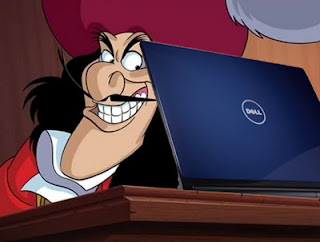 |
| Online Piracy |
I was outraged yesterday by my inability to access Wikipedia©, but my anger was not directed at the Wikimedia Foundation©. Instead it was directed at the United States Senate© and House of Representatives©, (as it so often seems to be these days). This is mostly due to their proposals of the PIPA and SOPA bills currently being discussed in Congress©. Both PIPA (Protect Intellectual Properties Act) and SOPA (Stop Online Piracy Act) are directed at limiting what the government believes is the Internet's continual violation of intellectual property.
To boil it down the bill opens the door for the Government to shut down access to any website which copyright infringed material is illegally displayed or uploaded to sites, and in case you were just recently transported to 2012 from 1985, that basically means 99.99% of the Internet. It also allows for criminal prosecution of violators, and I am not just talking about going after just the individual posters. The government and companies could go after the sites (like YouTube and BuzzFeed) that the materials are posted on. It would effectively begin an Internet-wide system of censorship, but I know what you will say. "The material has been copyrighted and by using it, websites and users are stealing money from the poor artists and companies that need those royalty payments to feed their starving Porsche's." To which I respond, "Get back in your DeLorean© and go back to the 80's," because what legislators don't get is how broadly this law can be applied.
As a writer I am well aware of the need for copyright laws and protection against intellectual theft. There is nothing more devastating to an artist than to have his or her creation stolen and sold off cheaply like how (I assume) my kidney was after that time I woke up in a bath of ice in that garage in Mexico. Yet, there is a difference between intellectual theft and freedom of speech. Take for example my blog, Meta-Humanity©. If SOPA and PIPA were to pass, I would be completely fracked©. Every other line I write is littered with cultural references from movies, TV, books, etc. The problem is that, I write this blog along the lines of my personality and if I make pictures or write references to copyrighted material it is not with the intent of stealing revenue or committing intellectual theft, instead I use it as a common frame of reference. If anything I create homages to popular culture for comedic purposes. Yet, under the new law someone like me could even face prosecution, (and I'm not built for jail, I'm too pretty).
I have not disagreed with a piece of legislation so much since Congress introduced their 2006 Superhuman Registration Act©, and I am not the only one. Wikipedia© went dark for the entire day on January 18th with the tagline "Imagine a world without free knowledge," with other sites such as Reddit© following Wikpedia©'s lead. Google© blacked out their logo in protest, and even Craig's List© put a message of protest that could be seen before you could access their site. You know it must be serious when a website dedicated to selling old lawn chairs and trying to connect a random person with that cute guy who was wearing a red hat on the train today, stands up and takes notice. Other opponents of these bills are some lesser and more obscure companies with names such as: Yahoo©, YouTube©, Facebook©, Twitter©, AOL©, Linkedln©, eBay©, and Mozilla©.
I have not disagreed with a piece of legislation so much since Congress introduced their 2006 Superhuman Registration Act©, and I am not the only one. Wikipedia© went dark for the entire day on January 18th with the tagline "Imagine a world without free knowledge," with other sites such as Reddit© following Wikpedia©'s lead. Google© blacked out their logo in protest, and even Craig's List© put a message of protest that could be seen before you could access their site. You know it must be serious when a website dedicated to selling old lawn chairs and trying to connect a random person with that cute guy who was wearing a red hat on the train today, stands up and takes notice. Other opponents of these bills are some lesser and more obscure companies with names such as: Yahoo©, YouTube©, Facebook©, Twitter©, AOL©, Linkedln©, eBay©, and Mozilla©.
 |
| Stop Online Piracy and Protect Those Who Cannot Protect Themselves, Corporations. |
The problem here, (and has always been,) is that the Government really does not know what to make of the Internet. On one side it can be a source of entertainment much like movies or TV, but it can also be a source of revenue or purchasing, like a business. On another side it can be a source of information and news like newspapers or encyclopedias, and on yet another it is also a community of people who discuss topics and express opinions. Congress has to realize that the Internet cannot be treated like a single entity, because when you make broad and vague laws that apply to the web's business side, those laws also have the potential to touch and impact all those other aspects of the Internet.
The whole problem is made worse by the fact that, ultimately, limiting and policing the web never seems to work. The real pirates and criminals often slip away into the vastness that is the World Wide Web leaving only the innocent or well-meaning among us to share the full brunt of unjust laws. Besides we should really be looking to be lay blame where blame is due, and in my opinion we have been sorely in need of regulations on Canada for a long time now.

No comments:
Post a Comment